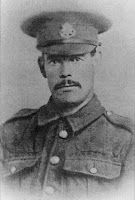On this day of remembrance I felt it was only appropriate to write a few words about my hero ancestors. My family is not unique. Like everyone who delves into their ancestry I have found many family members who went off to fight for their country, to 'do their bit'. Some made the ultimate sacrifice and were laid to rest where they died; some don't have a final resting place; all live on through stone memorials. Others were fortunate enough to make it through their war and return to homes and families. They may not have returned unscathed, either mentally or physically, but return they did. They aren't marked on a memorial but, like their fallen brethren, they are remembered. To me, they are all heroes.
Charles Stracey 1894-1917
My great uncle Charles was 22 years old when he died in France on 17th February 1917. A private in the 6th Battalion, Princess Charlotte of Wales (Royal Berkshire) Regiment, it's probable that he died during the action taken at Miraumont to capture several German trenches. During the early hours of the 17th February, as the troops assembled in preparation to go over the top, the Germans heavily barraged the assembly areas. Most of the day's casualties happened as a result of this barrage and I believe, as Charles' body was never recovered, that it was at this point that he died. His name is recorded on the great Thiepval Memorial to the missing in northern France.
 |
| Samuel Ezekiel Hardwick |
Sam Hardwick, my great grand uncle, died of wounds on 7th April 1917. He was a private in the 8th Battalion, Queen's (Royal West Surrey) Regiment. I've been unable to work out where or when he was injured but I find it quite distressing to think that he may have suffered dreadfully in a casualty clearing station before finally succumbing to his wounds. He is buried in Calais Southern Cemetery (which I'm glad to have visited in 2010 to lay some flowers on his grave) and left behind a wife and seven year old daughter.
James Ivanhoe Cullip 1894-1918
James is an ancestor that I've written about before. One of my great uncles, he served as a gunner in the Royal Garrison Artillery, one of the men employed to pound the German lines with their big guns. He survived the war but tragically died two weeks before the armistice, and just one week after getting married, as a result of the Spanish Flu pandemic.
Thomas William Cullip 1899-1964
Great Uncle Thomas had been 18 years old for just two weeks when he enlisted in the Royal Navy in 1917. After training on HMS Pembroke he became a member of the crew of HMS Juno in March. He served on Juno until he was demobbed in April 1919.
My first cousin twice removed, Albert Cannon, enlisted aged 19 in the Royal Garrison Artillery in 1915. Luckily for me, his is one of the few surviving service records which gives a wealth of information about his time in service. He survived the war and even volunteered for the Army of Occupation in 1919. After demobilisation in 1920 he sailed to Canada where he married and created a new life away from a war weary Europe.
Albert Stracey 1883-1945
My great uncle Albert also survived the war but suffered for the rest of his life from the effects of shell shock. He enlisted into the Royal Berkshires in 1915 at the age of 32. However, just 18 months later he was discharged from service under Paragraph 392 of King's Regulations 1912. He was deemed no longer physically fit for war service and issued with the Silver War Badge. My father remembers how Albert would sit in his chair and physically shake, an affliction he suffered with for the rest of his life.
 |
| Nathaniel Joe Stracey |
My grandfather is another person I've written about previously. He served in the 5th Battalion, East Kent Regiment, the 'Buffs', in Mesopotamia and India. He survived the war unscathed.
John Stracey 1885-1949
I believe my great uncle John may have been one of the Old Contemptibles. Before the war he was a soldier in the regular army, serving as a private in the 1st Bedfordshire Regiment and his medal record shows that he qualified for medals from the 16th August 1914 - he was in it from the start! He may have fought at such major battles as Mons, Ypres and the Somme. Incredibly, he survived the whole four years of war.
 |
| Joseph Roy Stracey |
I've written quite a lot about my uncle Roy so please see my previous post for an account of his brief life and death. Roy was a royal marine serving on HMS Hermes when it was attacked and sunk by Japanese fighter planes on 22nd April 1942. He was only 19 when he died and his name is recorded on the Plymouth Naval Memorial.
At the going down of the sun and in the morning,
We will remember them.
